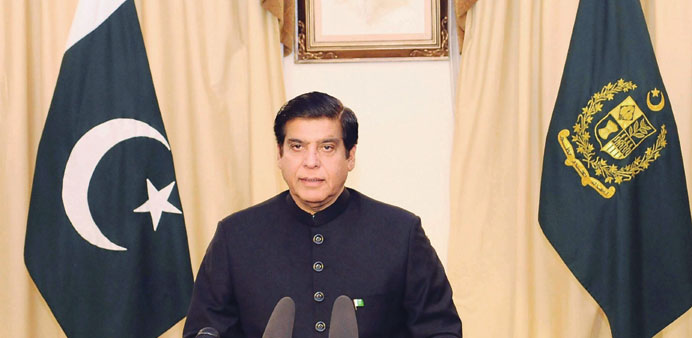|
Pakistani politicians yesterday were deep in consultations over the formation of a caretaker administration to lead the country in the run-up to elections due by mid-May. |
The civilian government led by the Pakistan People’s Party (PPP) made history by completing its full five-year term, but Taliban attacks and record levels of violence against Shia Muslims have raised fears about security for the polls.
“We are trying to create consensus over caretaker setup,” former information minister PPP spokesman Qamar Zaman Kaira said.
“The government has some reservations on the names proposed by the leader of the opposition, but we are still open to listen to opposition,” Kaira said.
According to Pakistan’s constitution, Prime Minister Raja Pervez Ashraf and opposition leader Chaudhry Nisar Ali Khan now have three days (until Tuesday) to agree on the caretaker prime minister.
If they do not reach an agreement, then the matter will go to an eight-member parliamentary committee consisting of members of the recently dissolved National Assembly.
The committee, which consists of four members from the government and four from opposition parties would have to decide on the caretaker PM within three days failing which the matter would go to the Election Commission of Pakistan.
The election commission’s decision, to be taken within two days, would be considered final.
Ashraf will continue in his seat as premier without his cabinet till a caretaker prime minister is selected.
The main opposition Pakistan Muslim League (PML-N) led by former prime minister Nawaz Sharif said that consultations on the caretaker prime minister were taking place within the party and with other opposition parties.
“Consultations are still taking place,” Siddiqul Farooq, a spokesman for PML-N, said.
“I hope that the name of caretaker prime minister will be decided by Prime Minister and the Leader of Opposition,” he said.
On Saturday, Prime Minister Raja Pervez Ashraf hailed parliament’s historic completion of a full term in office as a victory for democracy as he gave his farewell address to the nation.
Parliament, which held its last session on Thursday, has now become the first in Pakistan’s history to complete a full term, ending Saturday. Its dissolution is a milestone in a country where the military has seized power three times in coups and ruled for around half the country’s existence.
“It is matter of pleasure for me that an ordinary person like me is today prime minister of Pakistan and giving a hope of continuation of democracy to the nation,” Ashraf said in a nationwide televised address.
“There is a long history of tussle between the democratic and undemocratic forces in Pakistan, but the democratic forces have finally achieved a victory.”
Ashraf said key achievements in his party’s rule included the devolution of power to the provinces, but he admitted the government had been unable to solve the energy crisis.
He appealed for people to participate in the May elections, assuring voters that they would be fair.
“In the presence of political parties, independent election commission, effective media, civil society and judiciary, there is no chance of rigging in elections now,” he said.
“I appeal to all political parties, national institutions, civil society and mass media to complete the election process in an independent, peaceful and pleasant environment.”
Ashraf said he had reached agreement with the four chief ministers of the provinces for holding national and provincial elections on the same day.

